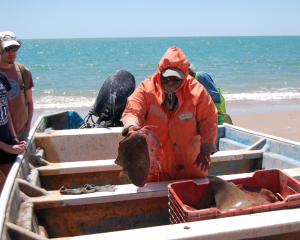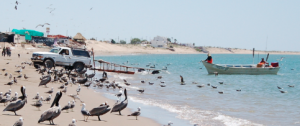We pulled into Kino Viejo around noon, running a little late and hoping we hadn’t missed out on all of the excitement. When we stepped onto the beach, fishing boats were floating near shore, waiting to be pulled out of the water to redeem their catch and end their long journey. One boat drove straight towards the beach at full speed, not stopping as it smoothly rode right onto shore without a slight hesitation.
We were at the working waterfront in Kino Viejo, or Old Kino. In the morning, the fishermen who had been out all night line the beach to bring in their catch, and we were prepared to greet them with big smiles and loads of questions.
One boat waited patiently in the waves until a pick-up truck bearing a trailer greeted it in the shallow water. The boat drove right onto the trailer bottom, and the truck pulled the boat ashore, where hoards of sea gulls and pelicans awaited their arrival. Once ashore, we approached the boat in anticipation of what they had caught. The bottom of the boat was filled with rays, minax shells, and an assortment of other fish mixed about, but before the boat even came to a stop the crew was back to work. They immediately began sorting through their catch and completing any last minute tasks that were necessary before they could sell their catch and head home to rest.

The main fisher on the boat was busy attending to the variety of rays sprawled throughout the boat, covered from head to toe in a thick orange suit, face covered from the sun and splashing liquids. It was not until the fisher spoke that we realized this was not the typical worker—the fisher was a woman. We had learned in the previous few days that the fishing industry in Kino was dominated almost completely by males, and we had also seen a strong male presence in Puerto Libertad. It was an empowering opposition to see a fisherwoman taking charge in an industry surrounded by males, and she exemplified that with hard work, you really can do anything.
The main fisher on the boat was busy attending to the variety of rays sprawled throughout the boat, covered from head to toe in a thick orange suit, face covered from the sun and splashing liquids. It was not until the fisher spoke that we realized this was not the typical worker—the fisher was a woman. We had learned in the previous few days that the fishing industry in Kino was dominated almost completely by males, and we had also seen a strong male presence in Puerto Libertad. It was an empowering opposition to see a fisherwoman taking charge in an industry surrounded by males, and she exemplified that with hard work, you really can do anything.
Down the beach, an old fisherman threw discarded pieces of fish to the massive clouds of pelicans and sea gulls shadowing the beach. The birds swarmed as the fish went airborne and the old man laughed as our class of tourists simultaneously swarmed to take pictures and get lost in the commotion.
Later on we drove around the neighborhood to get a feel for where fishermen live. As we got away from the coast, just a few blocks later, the structures shifted from large garages acting as fish houses to crowded neighborhoods filled with tiny dilapidated shacks, small concrete houses, and even more run-down squatter camps that barely had a roof above their head.
There was something redeeming about seeing the fishermen bring their catch ashore. After discussing the hardships and the societal challenges fishermen face, a boat filled with fish provided an image of success for an outsider looking in. But what we didn’t see was the inadequate profit fishermen received for their effort, the massive debt they have collected over the years, and the burden of struggling to keep their jobs.
At the end of the day, the fishermen and crew members will likely go home with fresh fish and money to support their immediate needs, but nothing more. There isn’t enough money to maintain a house or a car, which is evident driving thorough Kino Viejo. Many of us felt uncomfortable driving through the impoverished neighborhood like it was a zoo. We were taken aback at the surprising change in scenery, and it was a challenge to see the hard work we observed go to what we perceived as waste. Later on Cosme, our boat captain and a fellow Kino resident, told us that the squatters are the ones with the least shelter and materialistic belongings but they are the ones that he believes are working the hardest. They take advantage of the work as it comes, and when they see opportunity in an industry, they take it. They stay there until it’s no longer worth it, and then they move on to an area with more abundant resources and opportunities, never having a need to invest much in a temporary residence. Their income is enough to sustain themselves, but nowadays fishermen don’t have much to spare. The fishing industry lacks social mobility and not many alternate opportunities are available for fishermen to work elsewhere, so they do what they can with the income they receive. There doesn’t seem to be the humiliation we expected while driving around the community because at the end of the day, gauging hard work and success in small-scale fisheries is impossible from afar.
-Maggie Ruppel



I used to be suggested this website through my cousin. I am no longer sure whether this post is written through him as no one else realize such detailed approximately my difficulty. You are wonderful! Thank you!